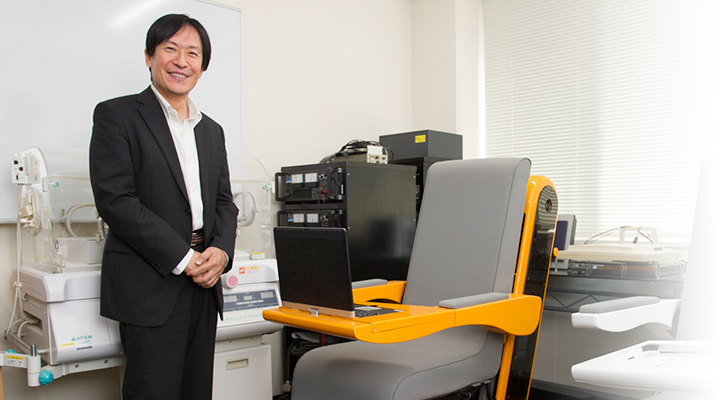
INTERVIEW
Understanding biological systems and developing human interfaces
Using cybernetics theory to
link people with machines and
connect developing nations
with advanced technology
Technical Creation Course
Graduate School of Advanced Science and Engineering
Prof. Toshio Tuji
Understanding biological systems and developing human interfaces
Fusion of human science and electrical/electronics engineering with medicine

Professor Tsuji is the representative of the Biological Systems Engineering Lab. The members of this lab pursue various different research projects aiming for a world where people and machines can work together.
“We start with an investigation of the human body. We examine the mechanisms in the human body and the brain that controls it all, and then build a robot equivalent to that. I’m interested in machines that are useful and easy for people to use”, says Professor Tsuji.
The research lab is broadly divided into the following five areas:

■Myoelectric Group: Research on how muscles and electric signals can be used to link machines electrically – symbolized by prosthetic limbs.
■Soft Computing Group: Research on artificial intelligence circuits, where a computer is used to regenerate in engineering terms the algorisms that living creatures possess, and input them into machines.
■A-Life Group: Research on ‘artificial life’, creating models of various forms of living creatures on computers.
■Biological Systems Group: Research on robots that can be easily used by people. Playing a role in automobile development in joint research with Mazda.
■Medical engineering group: Various collaborative medical-engineering research. Also involved in the development of new diagnosis support systems through collaboration between industry, academia and government.

The aim of these various research projects is ‘unimaginable results born from the fusion of people and machines’. For example, by implanting a man-made ‘brain’ in a prosthetic hand, the machine creates a program that matches with the human being. It is in the field of cybernetics that such a smart prosthetic hand can be created.
Professor Tsuji smiles. “By coming into contact with various different people outside of the university, we come across opportunities where we can truly feel ‘serendipity’ – the power to find something that you never would have imagined. That’s the charm of this kind of research”.
Cybernetics theory: humans and machines on the same playing field

In the Taoyaka Program, Professor Tsuji teaches a subject called Advanced Cybernetics Engineering.
Cybernetics is the field that looks at the mechanisms of the controls of living creatures and machines as unified principles, and was first promulgated by the American mathematician Norbert Wiener.
“Terms like cyber and cyborg also come from the concept of cybernetics. Cybernetics theory is an approach that makes sense in all fields involving human beings”, says Professor Tsuji.
In this course, students learn about that approach and specific examples, and ultimately will be required to present their thesis.
“For example, are the functions of cell phones really designed with consideration for people’s bodies? In this way, I want the students to develop the habit of reviewing the objects around them. In the 21st century, the idea of creating something ‘for people’ really should be at the forefront in engineering. A good example is extremely expensive medical equipment with functionality that people don’t use”.
Professor Tsuji also says that there are three steps that the students must go through to learn in this education and research.
“The first is the ability to understand an issue. The second is the ability to resolve an issue. And the third is the ability to discover an issue. I definitely want the doctoral students to acquire these three skills”, he says.
He says that the third is particularly difficult, but that this is the one that leads to research and new inventions.
“In the onsite portion of the program especially, there are a huge number of discoveries. The students first need to develop the ability to not miss such discoveries”.
Hoping that the ability to create something new will be applied onsite too

Professor Tsuji has extensive experience in initiatives that integrate the humanities with science, and expresses his agreement with the educational benefits of such integration in the Taoyaka Program.
“In the Taoyaka Program, I think that it is important that we train human resources who connect developing nations with advanced technology. By doing so, there is a possibility that the world will change. At the same time, I am very hopeful that the students will refine their own way of thinking too”, he says.
“I myself have continued to conduct research because I want to do something interesting, something different from everyone else. Ultimately, through collaboration between medicine and engineering, I hope that we’ll be able to create something that is useful for patients. And rather than shutting themselves away in their own field, I want the students to involve themselves proactively and create something new, while helping people with what they’re doing at the same time. I want to make this a place where they can develop that kind of mindset”.
Professor Tsuji says that he also wants to take to disadvantaged regions a machine that would enable easy discovery of illnesses, created as a result of the collaborative medicine-engineering research above.
“I want to build a machine that can screen for the possibility of diseases. The students in the Taoyaka Program are members of our family, just like the students in my research lab. I want them to grow even more through our team’s research activities”.

![]()
Toshio TSUJI
Professor, Electrical, Systems, and Control Engineering Program, Division of Advanced Science and Engineering, Graduate School of Advanced Science and Engineering
April 1, 2020 – Professor, Graduate School of Advanced Science and Engineering, Hiroshima University
April 1, 2002 – March 31, 2020 Professor, Graduate School of Engineering, Hiroshima University
April 1, 2001 – March 21, 2002 Associate Professor, Graduate School of Engineering, Hiroshima University
May 1, 1994 – March 31, 2001 Associate Professor, Faculty of Engineering, Hiroshima University
October 1, 1992 – July 31, 1993 Visiting Professor, University of Genova
April 1, 1985 – April 30, 1994 Assistant, Faculty of Engineering/Graduate School of Engineering, Hiroshima University





